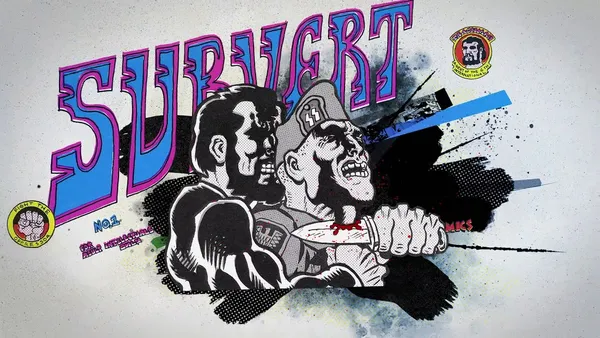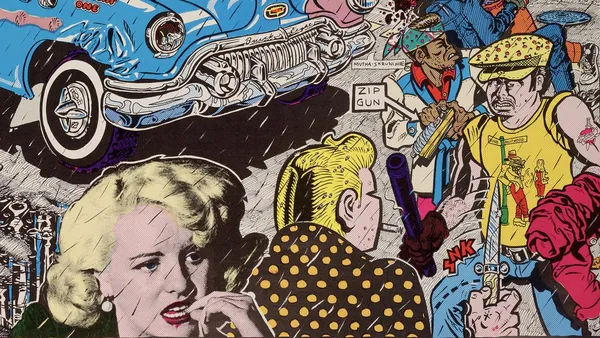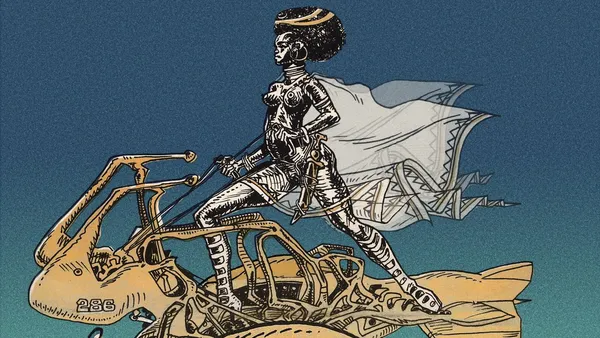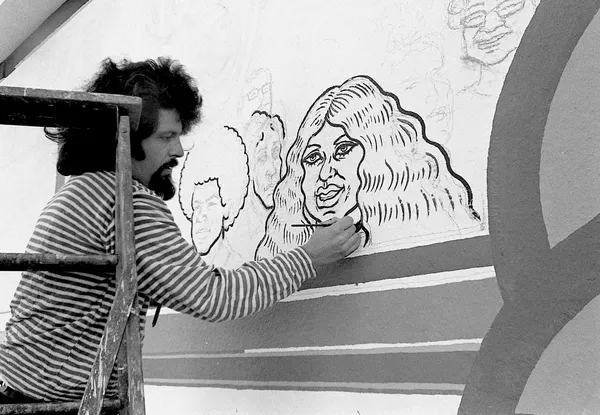 |
| Bad Attitude The Art Of Spain Rodriguez. Susan Stern: 'Spain was a pioneer in underground comics and he changed comics in this country forever' |
Stern is a news and documentary Emmy-nominated filmmaker for Outstanding Informational Programming, and Bad Attitude is a continuation of her interest in telling stories that are close to home. Her earlier film, The Self-made Man (2005), was about her father, who diagnosed with terminal cancer decides whether to take his own life. It’s a touching story of a daughter piecing together her father’s life story, as he discusses with his children this life defining choice. Meanwhile her 1998 documentary Barbie Nation: Unauthorized Tour, a deep dive critique into the famous doll, is taught in more than 1,000 universities.
From the world premiere at the Slamdance Film Festival, where Bad Attitude screened as part of the Breakouts section, Stern spoke to Eye For Film about not shirking away from the most controversial aspects of Spain’s life and work. She also defended her choice to not tell the audience how they should think about the ideas the film grapples with, accepting that for some it will be an uncomfortable experience.
Paul Risker: There are those who will come to the film knowing Spain’s work, and those discovering him for the first time. These are two different entry points to the subject, and is there anything we can hang our hats on to say there’s something important to this dynamic?
Susan Stern: It really gets down to the question of any artist - how much of it’s the person, and how much of it’s the work? We're trying to balance that in this film, so you can see the man and the artist together.
PR: You can only capture so much of a portrayal in a 71-minute documentary. A central part of this image is the flawed person, a work in progress like so many of us are. Is there an aspect of having to make choices that looks to convey his spirit, rather than the episodes of his life?
SS: We tried to have a critical point of view of Spain and we put in his most controversial work. There’s stuff in there about an experience he had when he was 14 years old, a gay bashing incident. There’s him riding with an outlaw biker club in the early 60s, and there were some people who were very critical of his depictions of women. So it's all in there, and we actually went through at one point and said, "What’s the most controversial, what's his most difficult artwork to look at? We’ve got to put all of that in there.”
The film in a very brief way also traces the history of comics in the US. You see him as a five-year-old kid reacting to the World War II comics that were racist towards the Japanese. We tried to catch the spirit of him rather than every single detail, and particularly what I don't like in any film about an artist or a person, is when you have to have what we call the validation sequence.
You've got to have people saying why this person is important, and why we want to watch this film. Spain was a pioneer in underground comics and he changed comics in this country forever. You’ve got to put that in, but in my mind a lot of people go on and on with that, and we tried not to, and we tried to have people say critical things.
PR: If you’re able to capture his story, then that tells us why he's important and repeating it would be unnecessary exposition. One of the aspects of the film I enjoyed, which ties into this expression of validation, were those moments in which you stepped back to observe Spain.
SS: You're trying to show things, and we had a struggle with how to start the film. My daughter always liked the scene that we ended up starting the film with, where Spain just opens the door and bursts in. Nobody is telling you about him, he's just being himself. You see him and you get that sense of the energy he had.
He did a lot of politics and he did history, but there was always this bit of self-satire in him. He didn't take himself that seriously, which I think is the saving grace.
PR: You can learn a lot about somebody without talking to them, only observing their actions and mannerisms. We should not always talk at the audience, but instead let them spend time with the person and discover how they feel about them.
SS: One of my favourite scenes in the film was actually a scene when Robert Crumb, of course one of the more famous and well known underground cartoonists came to visit. Robert just dropped in, and there he was sat at the kitchen table eating a corn beef sandwich and potato salad. I'm not a camerawoman, but I threw a light up top of the door, picked up a camera and just filmed the scene between the two of them. If people don't know comics they might not know that's Robert Crumb. Spain and Robert were very close, and it's a very touching scene.
 |
| Bad Attitude The Art Of Spain Rodriguez. Susan Stern: 'He did a lot of politics and he did history, but there was always this bit of self-satire in him' |
PR: Someone with little knowledge or interest in comics can still enjoy this film if they’re interested in people and how lives intersect with culture and politics.
SS: I think that's true. You also mentioned something earlier that you feel that Spain was flawed, that we're all flawed, and you see that in this film. You see the family dynamics between Spain and I, and our daughter Nora, who's an animator and an arts educator in New York. You see the scene of him teaching her how to draw, and so there's a lot there, but if you are into comics or if you're into art, then there's also a lot for you.
The other thing about Spain, especially for all of us who are trying to create, is that he was what Crumb always said about him: a pure artist in the sense that he just loved drawing pictures. There were people in the underground comics movement who were more famous than him, Robert Crumb was one, but I never saw him jealous, and I never saw him feel bad about himself because he wasn't as famous. I never saw him even care that much about how famous or successful he was, or what other people thought of him. He just made art because he wanted to make art.
PR: Understanding that you're part of something bigger than yourself, to be happy to contribute to the art form or the wider conversation is not necessarily an easy thing to embrace. So often as people the response, whether fame or success validates our feelings of self-worth.
SS: What you say is so true about wanting to be part of the conversation, of getting out of our own selves and our egos. There are so many wonderful characters in the film besides Spain, so many artists and writers, including [poet] Ishmael Reed, a MacArthur Fellow among other things, who grew up with Spain.
One of the characters that really moves me in the film is a young man who did actual prison time for graffiti. I think he did a year in prison and then risked his probation, because he wasn’t allowed to make art or even own art materials. He saw Spain's work and he did this mural at this old train station in Buffalo. No one knew who had done the mural, it was this big local mystery. This young man had such a strong love of art that he risked his probation to make art in homage to Spain.
PR: It's a touching part of the documentary and it speaks to a troubling desire in society to want to punish rather than to empower people. In the end you leave us to not only decide how we feel about Spain, but also to think about the broader ideas or questions raised by the film.
SS: I could be criticised for not telling people what to think about various issues, and I do leave it open to the viewer to decide what to think. Spain's depictions of women is something that a number of women in the film talk about, and there are Spain's politics. I like to leave things open for the viewer to make up their own mind.
 |
| Bad Attitude The Art Of Spain Rodriguez. Susan Stern on her husband: 'He just made art because he wanted to make art' |
You see a lot of films that are biographies of wonderful people, and I spend a lot of time in journalism, and when you do something that's just completely positive, we call that “doing a valentine.” On the other hand you can have things that are hatchet jobs, where they’re really critical. I feel with Bad Attitude you get both, and that may make people uncomfortable because they're going to have to grapple with it, and talk about it.
PR: Do you perceive there to be transformative aspect to the filmmaking process, where you change as a person?
SS: Oh, I think it does with various projects. I entered at one point and eight years later I exited at a completely different place. With this film there was a very personal reason for doing it - I also wanted to grapple with how I felt about Spain's work.
In addition to making the film, our team created a custom database for Spain's art and filed all of the art that we had, which took up about forty archival boxes. I looked at just about every drawing, and he made tens of thousands. One box would be “art in weird places”, which were these drawings he did on things, on envelopes and were just these very strange things. I read all of the Zap comics and I did this detailed outline of sex and violence to make my own analysis of it.
I feel like I came to terms with who he was and what he did, so I could move on with my life.
Bad Attitude: The Art Of Spain Rodriguez is streaming as part of Slamdance until February 25. You can buy a $10 pass for access to the festival here






















